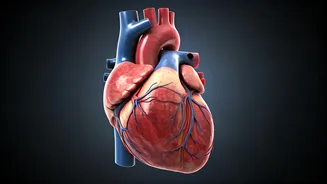Coffee and Heart Health
Coffee, a staple in many daily routines, has long been a subject of debate regarding its impact on health. This new research focuses on the relationship
between coffee consumption and the likelihood of developing an irregular heartbeat. The study aimed to ascertain whether there was a correlation between coffee intake and the occurrence of arrhythmias, a condition characterized by an irregular or abnormal heart rhythm. The results offer fresh insights into the intricate interplay between dietary habits and cardiovascular well-being. The study's findings are particularly relevant, given coffee's widespread popularity and the prevalence of heart-related health concerns. The research contributes valuable information to the ongoing discussions about the benefits and risks associated with coffee consumption. Understanding these relationships can guide individuals in making informed choices about their dietary habits and overall health management, ensuring they are taking care of their heart.
Key Study Findings
The principal finding of the study suggests a potential protective effect of coffee against irregular heartbeats. Researchers observed a connection between regular coffee consumption and a decreased risk of developing certain types of arrhythmias. This data offers a fresh perspective on how coffee, often viewed solely as a stimulant, might contribute to cardiovascular health. The study details the types of irregular heartbeats that coffee appears to help protect against, providing clear insights into the specific benefits. The data could influence individuals' approaches to dietary choices and health planning. The research also considered the influence of other lifestyle factors, such as smoking, exercise, and diet, that could affect the results. By accounting for these variables, the study aimed to isolate the influence of coffee, enhancing the dependability of its conclusions. This study provides crucial evidence, that coffee could have beneficial implications for people looking to improve their heart health through their dietary choices.
How Coffee Works
While the exact mechanisms behind coffee's protective effects remain under investigation, several theories have been proposed. One theory centers on the antioxidants present in coffee, which may combat inflammation and oxidative stress, both of which are linked to heart problems. Another theory suggests that coffee could influence the electrical activity within the heart, potentially stabilizing its rhythm. The researchers also examined the various compounds found in coffee, like caffeine and chlorogenic acid, to see how they affect the heart. Their investigation suggested how these compounds might contribute to its positive effects. Understanding the exact ways coffee interacts with the body is a major focus of ongoing research. Further studies will help to clarify these interactions and pinpoint the specific elements of coffee that contribute to heart health. This knowledge could help people to use coffee more efficiently, potentially to the advantage of their heart's wellness.
Implications and Considerations
The study's results carry significant implications for individuals and healthcare professionals. For those who regularly drink coffee, the research offers reassurance, suggesting that moderate consumption might not only be safe but also beneficial for heart health. However, it's essential to note that the study does not recommend starting coffee consumption solely for heart health benefits. The research emphasizes that the findings are based on observed correlations and do not prove a direct causal relationship. Furthermore, the study notes the importance of individual variability. People react to coffee differently; therefore, what works for one person may not apply to another. It's always best to consult with a healthcare professional before making any significant changes to your diet, particularly if you have existing health conditions. This consultation helps to customize dietary recommendations to individual requirements and health goals.














